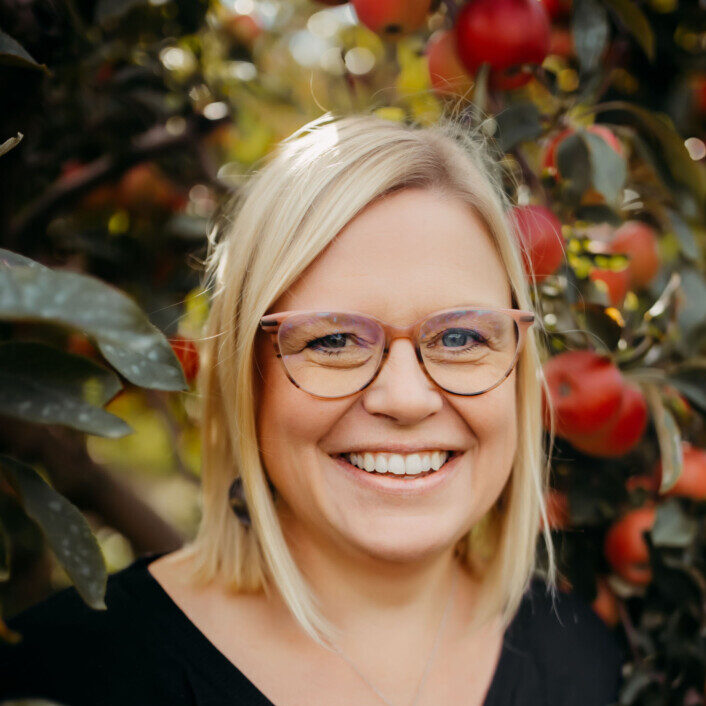In “Perfectly Imperfect,” a TedxMacatawa Talk I’ve watched and re-watched about a dozen times, my beloved college poetry teacher Jack Ridl asks, “What is something you used to do, something you loved to do, something you gave up because you weren’t good enough?” Jack tells of how he began each of his classes with this question, asking students to raise their hands if they had ever given up something that mattered to them. And all of them always did.
The thing I gave up — the thing I stopped doing as soon as I realized I wasn’t good enough — was singing in public. To be clear, natural musical talent is not a gift I was bestowed, evidenced by the fact that one can count my years of childhood piano lessons by the number of rhythm notebooks I accumulated.
But I always loved to sing, and when I was young, the children’s choir at church and music programs at school were a given. Everyone participated, no tryouts needed. I was quick to try out for solos and extra parts, and a few times, joined my sister and two cousins to provide the Special Music for our church’s evening service. Calling ourselves the Cousins Quartet, we gathered around one microphone and sang along to accompaniment music cassettes, or as my aunt called it, the “canned music” that was a popular item at Christian bookstores in the 90s.
It was around ninth grade that I stopped getting picked for special singing parts in the school choir. I joked that my slightly-out-of-tune voice must not be quite as cute anymore and decided my energy might be best directed into more successful ventures. I quit choir and joined the school newspaper instead.
During a recent Sunday morning church service, I was struck with the joy of the invitation to stand and sing aloud. I was moved by raising my voice to blend in with the voices of others without having it vetted first. And I was deeply aware that standing inside a church is the only place in my life where I receive this invitation, especially as my children are not particularly forgiving of my carpool karaoke, nor did they encourage my attempts to sing along to Pandemic Zoom church in the living room.
I love that there is room for my voice when we gather for worship. I love that there is room for so many voices without qualifications. It makes me think of the Brene Brown’s Braving the Wildnerness when she writes, “I intentionally go to a church where I can break bread, pass the peace, and sing with people who believe differently than I do,” and Rachel Held Evans’s Searching for Sunday when she writes, “Imagine if every church became a place where everyone is safe, but no one is comfortable. Imagine if every church became a place where we told one another the truth. We might just create sanctuary.”
I’ve written before on this blog how at different times in my life I’ve struggled with a stutter. But singing is a stutterer’s safe place. In music, there is breath. Scientists haven’t pinpointed exactly why this is, but research at The University of Iowa suggests that “Music is an activity in which you use the right side of the brain (language uses the left), so when you sing music, you’re no longer using your left brain (and probably no longer stuttering).”
The Stuttering Foundation of America offers other theories. One is that we use our vocal cords, lips, and tongue differently when we sing than when we talk. Another is that in singing, the pressure of time evaporates. We know what words are coming. There are no surprises, no word retrieval, no communicative pressure.
Likewise, my friend, an Episcopal priest, has told me about one of her parishioners who had a stroke. Once one of her congregation’s best readers of scripture, he now struggles to speak, but he can still sing in the choir. In songs, especially the most familiar, his voice comes back.
In our curated lives, most of us are somewhat choosy about who we talk with, who we spend time with, and which voices and news stories are shared on our cell phones and computer screens. I once heard a pastor compare our modern-day lives to a road trip in which we may be sitting in the same vehicle, but everyone is wearing headphones and tuned in to their own individual station. I wonder if that’s another gift of community worship; it cracks that isolation open and requires us to take out our headphones, tune into the same station, and sing together.
If worship is for God, if it’s an offering and a gift, rather than a manicured performance, then it is, by its very nature, inclusive. It doesn’t demand perfection but welcomes all voices with all their shortcomings, brokenness, and beauty. Paradoxically, the act of gathering together to sing makes space because we must put ourselves aside — we must let go of our insecurities, our self-consciousness, and our awareness of our slightly pitchy, out-of-tune voices. And in that offering of imperfection, our hearts and mouths are opened to receive the gifts of forgiveness, grace, and joy.

